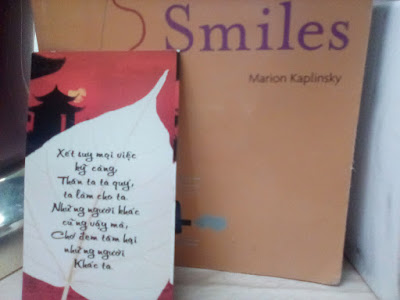The Secret to Peace of Mind
One of these principles is acceptance, the secret to peace of mind in an often troubled world. The anonymous author of an essay in a major twelve-step program textbook encapsultates the idea brilliantly:
"And acceptance is the answer to ALL my problems today. When I am disturbed, it is because I find some person, place, thing, or situation - some fact of my life - unacceptable to me, and I can find no serenity until I accept that person, place, thing, or situation as being exactly the way it is supposed to be at this moment."
The writer goes on to say that we often need to focus not so much on what needs to be changed in the world as on what needs to be changed in ourselves and our attitudes.
Some people reject this philosophy immediately because they misunderstand it. They protest, "But if I accept everything as it is, that means I have to accept war, crime, and injustice in society! It means I have to accept my salary as OK, and I want more! It means I have to accept my supervisor's uncaring attitude, and I don't like it! Those things are UNacceptable!"
The person who rails so hard against this principle as the key to defeating DIStress has missed two important phrases in the message of acceptance. The first is "at this moment." If there's a war going on, or crime in the streets, or social injustice in our communities, those things are realities. They are not going to go away in the next five minutes, or perhaps ever, completely. The people causing those situations are, unfortunately, doing what seems natural to them. You might say they're doing the best they can, based on who they are (out of their own experiences). Much the same may be said about salaries and supervisors - there is no magic wand to wave and make distressed over these facts of life, our energy is consumed by emotion. Our clear thinking turns to doom saying, daydreaming, or thoughts of revenge. The power to actually do anything about the situation escapes us.
The second phrase that qualifies the acceptance message is "not so much". The writer did not say that we should never try to change anything in the world around us. He or she does not imply that we should never dedicate ourselves to causes. Acceptance does not mean no chance for change. As a matter of fact, it means new energy to encourage change and more incisive, logical thinking to steer that course. In some cases, acceptance is perhaps the only chance for change.
One example is the case where we become distressed about other people's behavior and embark on a crusade to change it. A man walking down the street happened to see a little boy in his front yard pulling a cat's tail. The cat was making quite a ruckus, and the passerby thought the boy needed a lesson in kindness to animals. "Little boy, stop pulling that cat's tail!" instructed the man. The boy replied, "I'm not pulling the cat's tail." "Yes, you are," the adult responded. "I can see with my own two eyes that you have the cat's tail in your hand and you are pulling it very hard." "Oh, no," said the boy. "I'm just holding on. The cat's doing all the pulling."
Recognizing that there's another point of view is a crucial step in acceptance. And sometimes, if the situation is going to change, there has to be some "letting go."
The anonymous author of the wise tidbit about acceptance had another thing right: Acceptance starts with change inside you. That' what sometimes makes it so hard to master the acceptance habit. But like all habits, thought difficult to start, acceptance becomes ingrained, flowing more easily as time goes along. It simply becomes a part of your natural way of dealing with the world.
The road to acceptance begins the journey toward more power and peace of mind.
Steve Bell
Words:
embark: enter into, participate = jump on, go aboard, take off : dấn mình vào, tham gia, dự vào
crusade: do battle, agitate, campaign, take up arms : cuộc vận động, đi viển chinh
ruckus: náo loạn
encapsulate: gói lại : bundle, pack



Comments
Post a Comment